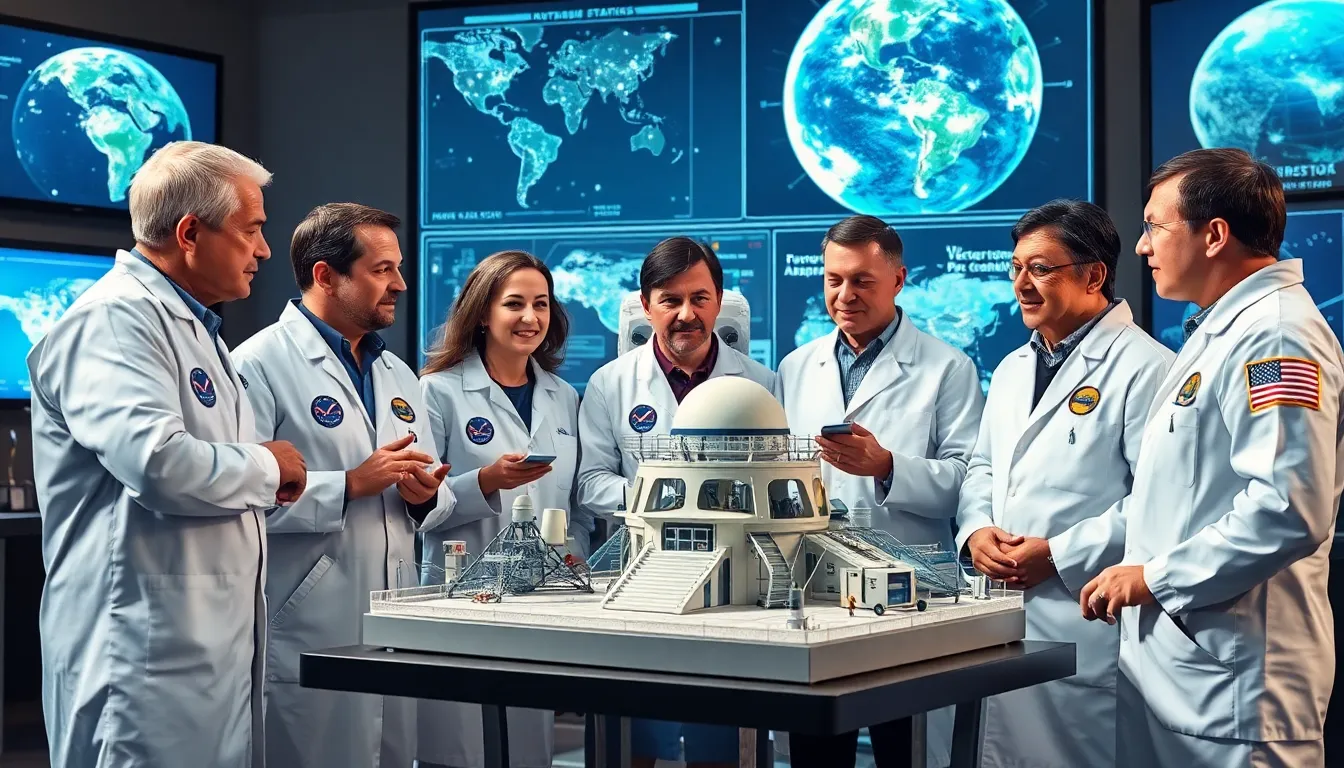In a universe filled with mysteries and endless possibilities, the Science Space and Technology Committee stands as a beacon of innovation and exploration. Imagine a group of brilliant minds, armed with knowledge and a dash of humor, tackling the biggest challenges of our time—from climate change to space travel. They’re not just talking about the future; they’re building it, one groundbreaking project at a time.
Table of Contents
ToggleOverview of the Science Space and Technology Committee
The Science Space and Technology Committee operates at the forefront of innovation, tackling challenges and shaping the future of exploration. This committee comprises experts who combine scientific knowledge with a touch of humor to address pressing issues.
Role and Responsibilities
Tasks of the committee include overseeing research initiatives, guiding technological developments, and evaluating funding for space-related projects. Members assess the viability of scientific proposals, ensuring alignment with national interests. They also collaborate with academic institutions and private sectors to facilitate advancements in aerospace technologies. Through these collaborative efforts, the committee promotes sustainable practices and develops strategic approaches to climate change and space exploration.
Importance in Policy Making
The committee plays a crucial role in shaping scientific policy. Its recommendations influence legislation related to space exploration and research funding. Each year, members present findings to Congress, helping to secure necessary resources. Engaging with the public fosters awareness of science and technology’s impact on everyday life. Driven by goals of innovation and exploration, the committee ensures that the United States maintains its position as a leader in space endeavors.
Key Areas of Focus

The Science Space and Technology Committee concentrates on pivotal areas that drive innovation and address contemporary challenges. Their efforts encompass space exploration and scientific research.
Space Exploration Initiatives
Space exploration initiatives aim to expand humanity’s presence beyond Earth. The committee assesses projects focused on human missions to Mars and lunar bases. These initiatives prioritize international collaboration, leveraging partnerships with other nations and private companies to maximize resources and expertise. Funding allocation emphasizes sustainable technologies for deep space travel, ensuring that exploration progresses without compromising environmental integrity. Notably, the Artemis program exemplifies the committee’s commitment to returning humans to the Moon and establishing a foundation for future Mars missions, fostering breakthroughs in aerospace technology.
Scientific Research and Development
Scientific research and development play a crucial role in advancing knowledge and technology. The committee oversees funding for innovative projects within universities and research institutions, emphasizing cutting-edge research in astrophysics, climate science, and planetary science. Collaboration with academic entities enhances the quality and relevance of research activities. Promoting interdisciplinary work leads to solutions that address global challenges, such as climate change and health. Alongside this, assessing the viability of scientific proposals ensures alignment with national priorities and strategic goals, reinforcing the committee’s commitment to fostering sustainable advancements in science and technology.
Recent Achievements
The Science Space and Technology Committee achieved notable successes recently in both legislation and technology. Their efforts shape the future of space exploration and scientific development.
Legislative Accomplishments
Significant legislative achievements demonstrate the committee’s impact on space policy. This year, they passed the Space Innovation Act, enhancing funding allocation for research initiatives. Funding increased by 20%, targeting climate change research and deep space missions. Collaboration among key stakeholders has improved, resulting in a more robust framework for international partnerships. Efforts also focused on developing regulatory measures that prioritize safety and sustainability in space activities. By streamlining approval processes for innovative projects, the committee created new opportunities for private sector involvement in space exploration.
Technological Advancements
Recent technological advancements highlight the committee’s commitment to innovation. They evaluated and funded over 50 groundbreaking projects in aerospace technology during the last fiscal year. Developments in propulsion systems promise faster travel to deep space destinations. Investment in AI-driven technologies enhances data analysis in environmental monitoring and space exploration. The committee also supported advancements in satellite technology, improving Earth observation capabilities. Partnerships with leading academic institutions have fostered breakthroughs in material science, crucial for constructing spacecraft designed to withstand harsh environments.
Challenges Faced
The Science Space and Technology Committee encounters various challenges that can impact its mission effectiveness.
Budget Constraints
Funding limitations significantly restrict the committee’s capacity to initiate and sustain ambitious projects. Agencies often rely on annual appropriations, which fluctuate based on political climate. Consequently, limited budgets hinder research and development efforts, particularly in innovative areas like climate science and aerospace technology. The recent 20% funding increase from the Space Innovation Act aided some initiatives, yet ongoing financial uncertainties persist. Organizations within the committee often struggle to balance immediate needs with long-term goals, impacting overall progress in space exploration and climate initiatives.
Political Pressures
Political influences shape the committee’s objectives and operational strategies. Members frequently navigate shifting priorities based on the current administration’s agenda. Legislative changes can redirect focus from essential projects to politically favorable initiatives. Collaboration with bipartisan partners is critical for maintaining the necessary support for funding and research efforts. External pressures often affect stakeholder engagement, causing disruptions in planned projects. Rapid changes in policy direction can introduce uncertainty, complicating relationships with academic institutions and private sector partners.
Future Directions
The Science Space and Technology Committee focuses on advancing initiatives that push the boundaries of aerospace innovation and exploration. This commitment to shaping the future involves numerous essential upcoming projects and strategic goals.
Upcoming Projects
Human missions to Mars and the establishment of lunar bases stand among the committee’s primary upcoming projects. The Artemis program seeks to return astronauts to the Moon, serving as a critical step towards Mars exploration. Satellite technology advancements aim to enhance Earth observation capabilities, promoting climate monitoring and response. Research initiatives targeting climate science facilitate interdisciplinary approaches, ensuring effective collaboration with academic institutions. Enhancements in propulsion systems promise to enable faster deep space travel, bolstering ambitions for exploration beyond current limits. These projects illustrate the committee’s dedication to remaining at the forefront of scientific research and innovation.
Strategic Goals
Promoting international collaboration constitutes a strategic goal for the committee’s efforts. Prioritization of sustainable technologies strengthens global partnerships while addressing climate change challenges. Fostering advancements in AI-driven technologies complements their mission to improve environmental monitoring systems. Ensuring funding flows align with national interests guarantees the continued support for critical projects. Engaging the public through awareness campaigns on the benefits of space exploration enhances scientific literacy. Overall, these strategic objectives position the committee to maintain the United States’ leadership in science and technology initiatives, ensuring a future defined by innovation and discovery.
The Science Space and Technology Committee stands as a pivotal force in shaping the future of exploration and innovation. With a commitment to addressing pressing global challenges it continues to foster advancements in aerospace technologies and sustainable practices. The committee’s proactive approach ensures that the United States not only leads in space endeavors but also engages the public in understanding the significance of science and technology.
As it navigates challenges such as budget constraints and political pressures the committee remains focused on groundbreaking projects that promise to expand humanity’s reach beyond Earth. Through collaboration with various stakeholders and a dedication to interdisciplinary research the committee is poised to drive significant progress in both space exploration and climate science. The journey ahead is filled with potential and the committee’s efforts will undoubtedly leave a lasting impact on future generations.





